Vietnam: What is the event of gaining independence, separating from the British Commonwealth, and establishing the Republic of South Africa about?
What is the event of gaining independence, separating from the British Commonwealth, and establishing the Republic of South Africa about?
The event of gaining independence, separating from the British Commonwealth, and establishing the Republic of South Africa in 1961 marked a significant turning point in the country's history. This event was not only a milestone affirming South Africa's sovereignty but also laid the groundwork for subsequent struggles to abolish racial discrimination policies.
Below are the contexts leading to this event, the process of gaining independence unfolded, and its significance for South Africa and the world:
|
Event of gaining independence, separating from the British Commonwealth, and establishing the Republic of South Africa (1) Overview of the event |
---
Note: The information is for reference only!

What is the event of gaining independence, separating from the British Commonwealth, and establishing the Republic of South Africa about? (Image from the Internet)
What are the perspectives on developing the History and Geography curricula at the lower secondary level in Vietnam?
Under Section II of the General education program for History and Geography at the lower secondary level promulgated with Circular 32/2018/TT-BGDDT, the perspectives on developing the History and Geography curricula at the lower secondary level in Vietnam are as follows:
The History and Geography curricula at the lower secondary level adhere to the provisions in the overall program while emphasizing several points of view:
(1) The curriculum aims to develop scientific thinking in students, allowing them to view the world as an integrated whole in both spatial and temporal dimensions based on fundamental knowledge and learning tools for researching history and geography; thereby, forming and developing specific abilities along with general competencies, especially the ability to apply knowledge and skills in practice and creativity.
(2) The curriculum inherits and promotes the strengths of the History and Geography subjects in the current general education curriculum and absorbs the experience of subject curriculum development from advanced countries. The subject content ensures equipping students with foundational, comprehensive, and scientific general knowledge; suitable for the psychological and cognitive characteristics of students, taking into account the teaching conditions in Vietnamese schools.
(3) The historical education content is designed chronologically, from prehistoric times through ancient, medieval to modern and contemporary times; in each period, there's an interleaving of world history, regional history, and Vietnamese history. The geography education content flows from general geography to regional geography and Vietnamese geography. It emphasizes selecting themes and connecting knowledge and skills to form and develop competencies in students while valuing the distinctive features of historical and geographical sciences.
(4) The curriculum emphasizes the application of active educational methods, highlighting the use of varied teaching aids and diversifying teaching and assessment methods to form and develop qualities and competencies in students.
(5) The curriculum ensures connectivity with the History and Geography curricula at the primary level and the History and Geography curricula at the upper secondary level; ensuring coherence and connectivity between grades, education levels, and subjects, as well as educational activities in the general education program.
(6) The curriculum is open, allowing flexible implementation depending on local conditions, the target student groups (students in disadvantaged areas, students with special support needs,...).
What are the specific duties of lower secondary school students in Vietnam when learning History and Geography?
Under Article 82 of Education Law 2019, the specific duties of lower secondary school students in Vietnam when learning History and Geography are:
- Perform learning and training tasks according to educational programmes and plans, code of conduct of educational institutions.
- Respect teachers, staff and workers of educational institutions; maintain solidarity and mutual support in learning and training; adhere to rules, charters and regulations of educational institutions; and comply with the law.
- Participate in labour and social activities, environmental protection activities appropriate to their age group, health and ability.
- Preserve and protect properties of educational institutions.
- Contribute to the building, protection and development of the traditions of educational institutions.

